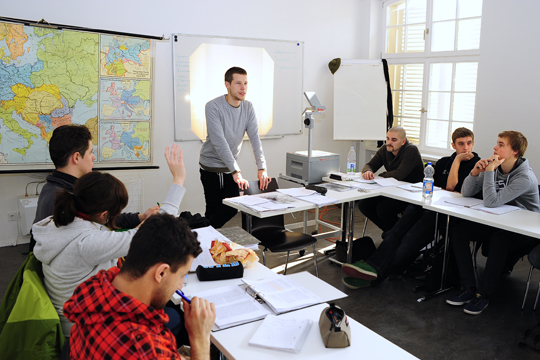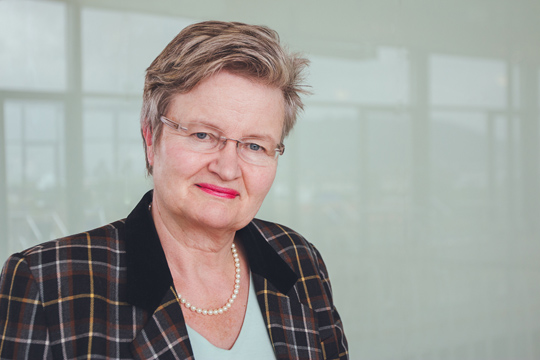Ensuring quality teaching
Freiburg, Oct 26, 2017
The Excellence Initiative is not the only marathon which the University of Freiburg is training for. In late September 2017 our application to be admitted into the accreditation system was submitted. Assuming the application is successful, the university will then be permitted to quality control its own more than 200 study programs - a task which until now has been carried out by external agencies. To give programs the seal of the accreditation council , the university must prove its ability in a process which runs for nearly two years. Rimma Gerenstein asked Professor Dr. Juliane Besters-Dilger, Vice-President for Academic Affairs, about her hopes for system accreditaion.
 Photo: Thomas Kunz
Photo: Thomas Kunz
Professor Besters-Dilger, why has the university decided to apply for system accreditation?
The transition from the current program accreditation to a systematic one was a part of our structure and development plan 2014-18. We began looking at this option in earnest in 2015. A team visited system-accredited institutions of higher education and gathered information on their experiences. On that basis we developed a concept which will work for Freiburg and which takes into account the variety of our subjects and faculties. In the winter semester 2016-17 we started a test run with ten study programs in the Faculty of the Humanities, and we were very happy with the result. But we are not the only ones who are taking this road. Here in Baden-Württemberg for example, nearly all the universities have opted for system accreditation; Mannheim and Ulm, like Freiburg, are on the way to it.
What advantages do you see?
In the future, institutions of higher education will have an ever-greater task of quality managing their programs and services. This gives us the chance to gain more autonomy. Up to now, our courses were checked by external referees sent by agencies. It's clear that they cannot always be familiar with the specific features of the particular subject here in Freiburg. With system accreditation we are taking quality management into our own hands. Also, the accreditation process will be less work for the subjects and the faculties.
What will change for the faculties?
They will have more responsibility and more freedom to develop their degree programs the way they want them. The Internal Accreditation Committee (IAA) was formed at the end of December 2017. Each faculty sends eight delegates - two teaching staff, two representatives of the mid-level academic staff, two administrative staff members, and two students. In addition, the student union has the option of appointing two further representatives. All together - 90 people. Each individual accreditation however is conducted by a five-person group. In this way we ensure that members of the IAA are not overloaded with work.
 "The whole process is a chance to reinforce the culture of quality in our teaching" - Juliane Besters-Dilger sees great advantages in system accreditation.
"The whole process is a chance to reinforce the culture of quality in our teaching" - Juliane Besters-Dilger sees great advantages in system accreditation.
Photo: Sandra Meyndt
Isn't there a danger that objectivity will be lost if quality management becomes a decision we make about ourselves?
Not at all. Each degree program must be audited every six years by referees who are mostly external, just as before; that's alongside the program's own internal quality monitoring. That view from the outside is absolutely necessary. Referees are selected according to requirements which ensure that they are not biased. The advantage of that is that the programs are able to suggest which referees may be invited, taking the necessary requirements into account. They may choose people who know that area particularly well and from whom they can expect a fair and realistic evaluation.
System accreditation is often criticized for being too expensive.
That is true, system accreditation is expensive - but it is also a recognized guarantee of quality. The whole process is a chance to reinforce the culture of quality in our teaching, to take a critical look at our courses, and to keep on developing them - and to do so in a discussion which includes the entire university.
System accreditation
In September 2017 the University of Freiburg submitted its application for admission to the system accreditation process to the Zentralen Evaluationsagentur (ZEvA) in Hannover. In this process, the University of Freiburg has to prove that it is able to conduct quality management of its degree programs independently. Previously its Bachelor's and Master's degree programs were quality tested by external agencies in the program accreditation process. The transition to the new process is slated for mid-2019. The quality management team in Academic Affairs from the teaching development section is responsible for the process at the University of Freiburg.
More information at the quality management website
www.uni-freiburg.de/go/qmlehre

